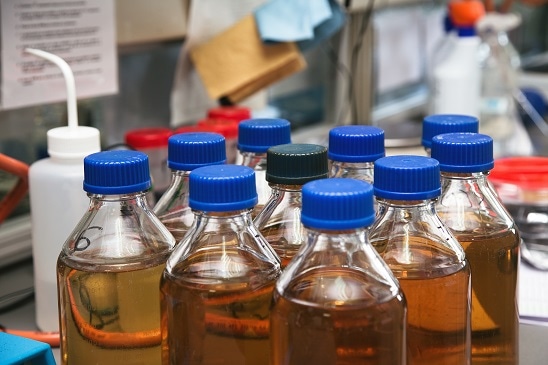Key Takeaways
- A recent survey revealed that 82% of labs have adopted sustainability metrics, with 92% of these labs using these metrics to monitor resource use and 87% committing to goals aimed at reducing their global greenhouse gas (GHG) and carbon emissions.
- Analytical labs need to develop strategies for sustainability, which could include reducing waste, enhancing systems and processes management, and setting clear sustainability goals.
- Digital tools, including AI and ML, can streamline asset usage and enhance overall lab efficiency. Future lab instruments will likely have built-in intelligence for real-time feedback on their operational status, facilitating efficient management and sustainability benefits.
Scientific research labs worldwide are fundamental in propelling scientific understanding and pioneering transformative healthcare solutions. Yet, the resource-intensive nature of the work has brought their environmental footprints under the microscope. Concerns primarily revolve around energy use, waste production, chemical handling, and equipment disposal, all of which can leave a substantial environmental imprint.
In an era where global sustainability is increasingly pressing, labs are grappling with the challenge of harmonizing their scientific progression with ecological responsibility. The silver lining is that strides are being made in this direction. A recent survey on lab sustainability by Frost & Sullivan unveiled that 82% of labs questioned have adopted sustainability metrics. Impressively, among these labs, 92% utilize these metrics to monitor resource use, and 87% have committed to goals aimed at curtailing their global greenhouse gas (GHG) and carbon emissions.

Reducing waste in labs
Waste is a prominent environmental concern, with numerous labs acknowledging the necessity to curtail waste production. They are realizing that even minor, straightforward behavioral modifications can yield significant results. Plastic management, for example, is a crucial waste-related issue for labs.
Conventionally, plastic is sterilized, incinerated, and transported across extensive distances, contributing substantially to carbon emissions. Moreover, the combustion of plastic releases a plethora of toxic chemicals into the environment.
On a positive note, the market is witnessing the advent of innovative solutions for enhanced plastic waste management in labs. One such solution is a sterilization procedure that is over 90% more carbon-efficient, harnessing a combination of mechanical and chemical processes. This groundbreaking process eradicates the need for autoclave sterilization, which disinfects plastic waste using heat — in the form of steam — coupled with pressure and time.
Real-time monitoring of lab assets
The enhancement of lab systems and processes management opens up a promising avenue for innovations that leverage the swift progression of digital tools. The cost-effectiveness of data monitoring and gathering across various analytical instruments, coupled with the deployment of technologies such as artificial intelligence (AI) and machine learning (ML), can streamline asset usage, and amplify overall lab efficiency.
Future lab instruments will likely be outfitted with features for monitoring and delivering real-time feedback on their operational status. They will possess built-in intelligence that alerts lab technicians if the instrument encounters an operational glitch that needs addressing or is running low on consumables. This real-time data will empower operators to make better-informed decisions, thereby facilitating the optimization of their lab assets for efficient management, superior scientific output, and sustainability benefits.

Geographic and industry progress
While there’s a growing consensus that labs are increasingly embracing sustainable practices, the pace of this commitment varies notably across markets and industries. For instance, the survey revealed that the U.K. has been leading the charge in sustainability practices, outstripping countries like the U.S., Germany, and China.
Impressively, 86% of British labs have already incorporated sustainability metrics, indicating a hopeful transition towards sustainability.
However, the dedication to sustainability is not uniform across various research sectors. The survey points out that forensic and drug-testing labs are lagging behind other sectors: a mere 72% have adopted sustainability metrics, compared to 82% to 87% of labs in other sectors such as life science research, pharma, biopharma, chemical, energy, environmental testing, and food.
Strategy insights for sustainable labs
Lab sustainability doesn’t have a one-size-fits-all solution. The survey indicates that the most prevalent action—undertaken by 72% of labs—is the reduction of carbon and GHG emissions. This can be realized through specific strategies like the adoption of energy-efficient equipment, modifications to ventilation systems, and the implementation of smart lab designs.
Optimization of water and energy usage, along with the improvement of waste management techniques, are favored strategies, with 68% of labs confirming their implementation. The waste produced by scientific labs can encompass hazardous materials, non-hazardous, and electronic waste (eWaste). Improper disposal of these materials can result in soil and water contamination. Hence, labs should institute waste segregation protocols, kick-start recycling programs, and partner with specialized waste management services to ensure the safe disposal of hazardous materials and eWaste.
Analytical instrument manufacturers play a part
Manufacturers of analytical instruments, such as Agilent, are already reevaluating their existing portfolios with a focus on miniaturization, dematerialization, ingredient optimization, and product efficiency enhancement to curtail chemical usage and surplus waste. For example, Agilent offers tools specifically designed to bolster asset management, leading to significant sustainability advantages. This amplifies visibility and control across the laboratory by capitalizing on data intelligence technologies to augment operational efficiency.
These lab services signify a fundamental shift in industry operations, as while they will necessitate incremental efforts and time for full integration, they will ultimately align with major industry transformations, making even gradual changes critically important.
Learn more about Agilent’s sustainability efforts and initiatives.